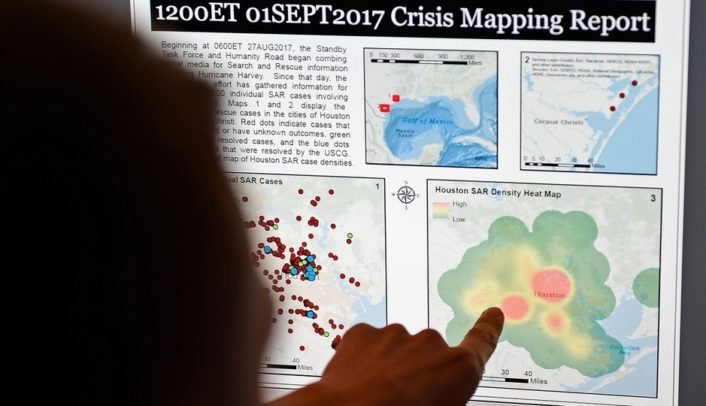
Source: http://www.theday.com
Public Health Practice – When Hurricane Harvey hit, and distress calls overwhelmed the 911 call system in Houston, the UNMC student response team jumped into action and was activated through their global partners at the Standby Task Force. The student’s role was to “mine” social media coming in from the affected area, and to record the longitude and latitude coordinates for people in need of rescue. This process, called geo-mapping, has been used for dozens of disasters around the globe since the inception of the task force in 2010. Information is compiled, verified, and then sent to the Urban Search and Rescue Teams that are working in the affected area. This experience was the first foray into geo-mapping for many of the UNMC students, and all expressed excitement about being able to respond during this emergency. Dr. Sharon Medcalf is the team’s faculty advisor. Dr. Medcalf noted that “Many of our team members graduated last May, and we hadn’t started this year’s recruitment. I was so impressed by the new students who came forward to join the geo-mapping effort. My colleagues at the Standby Task Force were overwhelmed with new applications and expressed their gratitude for the students who joined in to help the response.”
College of Public Health Student Angelia Wimberly reported, “This was my first experience with geo-mapping, so I did not know what to expect. I was surprised to find how easy it was, and I was excited to be a part of this task force. I have immediate family living in Houston, so this hit close to home for me. I was pleased to see how many students sprang into action and contributed to the rescue efforts.”
This student response team was modeled after similar successful programs at Emory University and the University of North Carolina. The team was created for three specific scenarios: an epidemiology outbreak team to assist local health departments with outbreak investigation and control. Points of dispensing (POD) assistance team to help public health emergency response coordinators with mass dispensing or immunization clinics. And a digital response team to assist volunteer agencies in systematic monitoring of social media.
The possibilities are endless for engaging student groups to assist organizations in emergencies, given that student populations at universities are replenished on a continual basis. University students from all disciplines are an untapped resource across the nation. The future of our response agencies belongs to the next generation of the workforce and giving students early access to valuable practice experience enhances the communities they will eventually serve. The ultimate goal for engaging student response teams is to ensure the safety and security of all communities across the nation, and the globe. This call to action begins with our colleges and universities.
This article was written by Sharon Medcalf, PhD, Assistant Professor, Department of Epidemiology, Director, Center for Biosecurity, Biopreparedness, and Emerging Infectious Diseases

